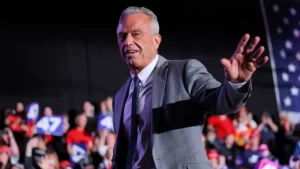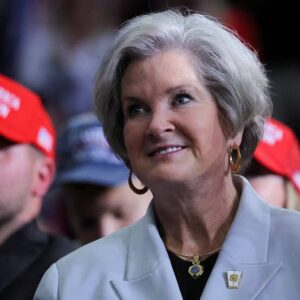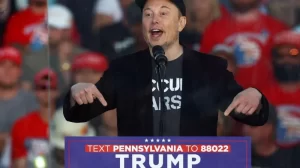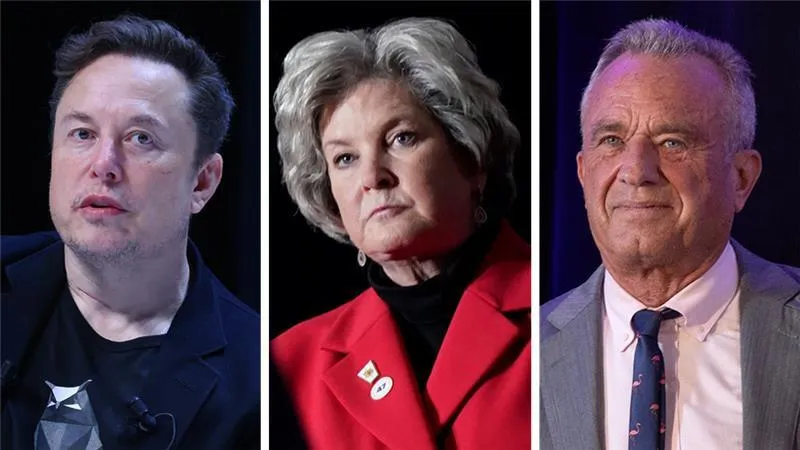Donald Trump’s transition team is already vetting potential candidates for key roles in his administration ahead of his return to the White House in January.
On Thursday, he made his first announcement, naming his campaign co-manager, Susan Summerall Wiles, as White House chief of staff.
Although many from Trump’s first term are not expected to return, some loyalists are rumored to make a comeback.
The president-elect is now surrounded by a new group of potential appointees to fill his cabinet, staff his White House, and take on significant government positions.
Here’s a look at some of the names being considered for top jobs.
Robert F Kennedy Jr

The past two years have been a tumultuous journey for the nephew of former President John F. Kennedy.
An environmental lawyer, he initially ran for president as a Democrat, with much of his family opposing his anti-vaccine stance and conspiracy theories while supporting Joe Biden’s re-election. He later switched to an independent candidacy but, struggling to gain momentum amid various controversies, withdrew from the race and endorsed Trump.
In the final two months of the 2024 election cycle, he led a Trump campaign initiative called “Make America Healthy Again.” Trump has since pledged that RFK Jr. would play a significant role in public health agencies like the CDC and FDA.
RFK Jr. recently argued for the removal of fluoride from drinking water, calling it an ineffective and harmful delivery method, though some experts have disputed his claims. In an NBC News interview, he denied being “anti-vaccine,” emphasizing that he wouldn’t take away vaccines but would instead provide people with “the best information” to make informed decisions.
Rather than seeking a formal cabinet position, Kennedy suggested he could play a broader role within the White House.
Susie Wiles

Trump’s landslide victory over Kamala Harris was orchestrated by campaign co-chairs Chris LaCivita and Susie Wiles, who Trump referred to as “the ice maiden” in his victory speech on Wednesday.
Wiles has now been confirmed as the incoming chief of staff for Trump’s second administration, making her the first woman to hold the role. She is also Trump’s first confirmed appointment for his second term.
Although Trump described her as someone who “likes to stay in the background,” Wiles is regarded as one of the most feared and respected political operatives in the country.
Less than a year into her political career, she worked on Ronald Reagan’s successful 1980 campaign and later served as a scheduler in his White House. In 2010, she played a pivotal role in turning Rick Scott, a political outsider, into Florida’s governor within just seven months. Scott is now a U.S. senator.
Wiles met Trump during the 2015 Republican presidential primary and became co-chair of his Florida campaign, a key swing state. Trump won Florida in 2016, narrowly defeating Hillary Clinton.
Republicans have praised Wiles for her ability to command respect and manage the large egos within Trump’s circle, which may allow her to bring a sense of order that his previous chiefs of staff were unable to achieve.
Elon Musk

The world’s richest man, Elon Musk, announced his support for Donald Trump earlier this year, despite having said in 2022 that it was time for Trump to “hang up his hat and sail into the sunset.”
Musk has since become one of Trump’s most prominent backers, donating over $119 million (£91.6 million) in the current election cycle to America PAC, a political action committee he created to support the former president.
As the CEO of Tesla and SpaceX, and owner of the social media platform X, Musk also launched a voter registration drive, offering a $1 million (£771,000) giveaway to a random swing-state voter each day during the final stretch of the campaign.
After registering as a Republican ahead of the 2022 midterms, Musk has become more vocal on issues such as illegal immigration and transgender rights.
Both Musk and Trump have discussed the idea of Musk leading a new “Department of Government Efficiency,” where he would work to cut costs, reform regulations, and streamline what they describe as a “massive, suffocating federal bureaucracy.” The proposed agency’s acronym, DOGE, humorously references the “meme-coin” cryptocurrency that Musk has previously endorsed.

